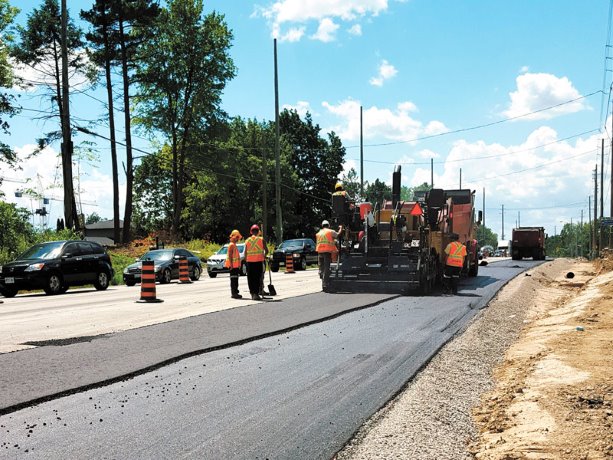Dishonest behaviour in the roadbuilding industry will not be tolerated, the Ontario Road Builders’ Association (ORBA) stated in response to the Ministry of Transportation’s (MTO) highway action plan, which was launched to address poor roadwork and flawed oversight.
"We will not tolerate any situation where a service provider in our industry has engaged in dishonest behaviour, or taken any actions that could potentially put road-users at risk," an ORBA statement reads. "If we are made aware of any behaviour that falls short of those standards we will take disciplinary action."
The statement follows the Feb. 17 release of the MTO’s Action Plan for Highway Construction Contracts and Oversight, which aims to enhance oversight, ensure value for money and improve asphalt pavement quality for Ontario’s roads, which was prompted by recommendations in a report released by Ontario’s auditor general last November.
In her annual report, Auditor General Bonnie Lysyk noted deficiencies in the MTO’s oversight processes around construction contracts. She noted pavement on some Ontario roads that is supposed to last 15 years cracked prematurely after just two or three, forcing repairs and significantly increasing the ministry’s highway repair costs.
She also reported the ministry paid contractors over $8 million in bonuses for meeting quality requirements in their contracts, even after it became aware that contractors may have tampered with samples.
Kevin Bentley
Ministry of Transportation
Organizations responsible for roadbuilding in the province including the recently amalgamated ORBA, the Ontario Hot Mix Producers Association and the Ontario Asphalt Pavement Council are looking to work collaboratively with the MTO to address the issues highlighted in Lysyk’s report.
"From our perspective, with our Ontario Asphalt Pavement Council, the quality of our work is always paramount to what we do," said Geoff Wilkinson, executive director of ORBA, on behalf of all three organizations. "In the (action) plan, as well as in the auditor general’s report itself, there is discussion around collaborating with industry. What was really important for ORBA to hear was the MTO’s perspective on continuing to work with ORBA and other stakeholders and in seeing the value of doing so."
According to the MTO’s manager of engineering, communication is key going forward.
"We are certainly committed to communicating with the industry and their suppliers so that they clearly understand any new changes or requirements in our contracts, but we are confident there will be limited impact to the construction industry as long as they are aware of the changes," said Kevin Bentley.
The MTO’s plan outlines nearly 50 specific actions that will be implemented starting this construction season, including removing incentives related to asphalt properties and compaction, raising the benchmark for asphalt smoothness and continuing to penalize contractors whose work fails to meet ministry standards.
In addition, the MTO will also be creating a panel of third-party experts to provide independent advice on proposed changes to contracts and contract administration.
"The ministry will also take over responsibility for the care, control and oversight of asphalt samples for all new contracts, create a fraud reporting tip-line by the end of spring 2017 so suspected violations can be reported anonymously and build a new Centre of Excellence for Transportation Infrastructure, which will allow for better research and testing of materials including asphalt," said Minister of Transportation Steven Del Duca in a statement released Feb. 17.
Bentley said the ministry also plans to step up inspections.
"In terms of asphalt cement, we are specifically increasing some of our inspections and testing of asphalt cement at the plant as well as on the road during the actual construction," he said. "We are now going to require contractors to provide documentation as to the quality of the asphalt cement that they are actually supplying."
The ministry will be implementing the extended Bending Beam Rheometer test, an aging test for all new contracts tendered after March 1, 2017.
"It was previously done on a pilot basis for some projects but now it’s going to be for all contracts," Bentley reported.
When it comes to the quality of asphalt, ORBA and the MTO are on the same page, Wilkinson said.
"We want to make sure as an industry that we are providing the quality that our owners are asking for and that we’re part of the solution in delivering that to them," said Wilkinson. "ORBA’s goal is to improve the quality of asphalt in Ontario to overcome some of the challenges that were identified."
The ORBA release reads, "We have been working on improving the quality of asphalt in the province for some time and will continue to work hard as an association with our partners at MTO to maintain consistently high standards across all aspects of our work."
Regarding contractor incentives, Bentley stated, "We will continue to offer incentives for asphalt smoothness, which we believe is a reflection of the contractors’ workmanship and has also proven to increase the overall durability of asphalt pavement…but any money not spent on incentives will just be reinvested into our annual construction program."
According to Wilkinson, ORBA will be meeting with its members in late March to discuss the challenges and root causes of asphalt issues. ORBA is planning another meeting with the owners — the MTO and municipalities — to get their perspective.
"With those two meetings behind us, we will be putting forth an ORBA action plan which we would like to work with the Ministry of Transportation on with their action plans," said Wilkinson.




Recent Comments
comments for this post are closed